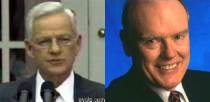Oil, Greenspan, China
Friday, April 14, 2006
Three-dollar gas - it's here. And that was before oil hit $71 a barrel yesterday. Five percent interest rates are here too - the ten-year note, one-year CDs - when was the last time you could put a U.S. Dollar in a bank and get back $1.05 at the end of a year?
Oil That Is, Black Gold
As if Iran, Iraq, Venezuela, and Nigeria were not enough, along comes this report about the future of Saudi oil wells:
Matt Simmons is getting smarter and smarter every month, but don't get the idea that you can benefit from rising oil prices. According to this story, the new oil ETF (USO:AMEX) is much too risky for average investors: Saudi Aramco's mature crude oil fields are expected to decline at a gross average rate of 8%/year without additional maintenance and drilling, a Saudi Aramco spokesman said Tuesday.
Saudi Aramco's mature crude oil fields are expected to decline at a gross average rate of 8%/year without additional maintenance and drilling, a Saudi Aramco spokesman said Tuesday.
But Saudi Aramco has taken a number of measures to offset a decline in output from the country's aging oil fields, the spokesman added.
"A variety of remedial activities are always being taken in oil fields influencing their effective decline rates," the spokesman said. "The drilling of additional development wells in the producing fields is Saudi Aramco's standard practice to offset normal declines of older wells."
This is particularly important when oil fields are progressively depleted under a well thought out strategy of maximizing the sweep and displacement efficiencies, leading to high ultimate oil recovery, the spokesman said.
"This maintain potential drilling in mature fields combined with a multitude of remedial actions and the development of new fields, with long plateau lives, lowers the composite decline rate of producing fields to around 2%," the spokesman said. A new financial instrument aimed at those pining to profit from the multiyear surge in oil prices is distressing energy and stock-market experts because of the allure -- and risks -- it presents to average investors.
Oooooh. Commodities are scary. The obvious solution? Don't be an average investor - be an above average investor, and if you are below the mean, give this oil ETF a whirl - you will likely become above average before you know it.
The United States Oil Fund, an exchange-traded fund that is expected to debut Monday and whose per-share value is designed to mimic the price of crude oil futures, is most appropriate for savvy institutional investors and may be OK for a small cadre of consumers looking to diversify their portfolios.
But near-direct exposure to volatile commodity markets is not right for those seeking a relatively safe way to increase the value of retirement savings or a nest egg, nor is it a smart way for armchair energy analysts to test their luck, said Ronald Sorenson, CEO and chief investment officer of W.H. Reaves & Co., a New Jersey-based investment firm that has specialized in energy and utilities for 45 years.
"Let's not confuse investing with speculation," said Sorenson, who prefers to put his clients' money into stocks and mutual funds where they can earn dividends and benefit from corporate share buybacks.
By the way, do you think Mr. Sorenson has tried factoring energy companies out of his recommended stock and mutual fund recommendations for the last couple years to see where that would have left him?
Now He Tells Us
In Asia this week, Alan Greenspan warns about falling asset prices:
As moderate long-term interest rates are a key objective in the Mission Statement of the Federal Reserve , overvalued assets would appear to be just an unimportant side effect of the Federal Reserve having been so successful. Former Federal Reserve Chairman Alan Greenspan warned on Wednesday a global glut in liquidity would result in a fall in asset prices.
Former Federal Reserve Chairman Alan Greenspan warned on Wednesday a global glut in liquidity would result in a fall in asset prices.
...
He said the market value of assets worldwide had been rising faster than nominal gross domestic product globally due to a decline in real long-term interest rates over the years and a significant fall in real equity premiums.
"A good part of this expansion is a direct function of the decline in real equity premiums," Greenspan said. "That cannot go on indefinitely."
He said asset prices would begin to fall, but did not predict when that would happen.
"I am reasonably certain that what we are looking at today is an abnormal situation," he said.
The Price of Being Too Loyal
The Washington Post reports that Treasury Secretary John Snow is not popular with new White House Chief of Staff Joshua Bolten and will be departing soon:
John Snow is probably smarter than he appears - he has a PhD in economics (for whatever that's worth), and as the former head of CTX is worth many millions. Why did he agree to banally repeat White House talking points for three years and generally appear buffoonish? He needs to write a book. As Treasury secretaries go, John W. Snow has had a relatively smooth run. He hasn't strayed from the Bush administration line, committed serious gaffes, presided over recessions, triggered financial market turmoil or gotten caught in a major scandal.
As Treasury secretaries go, John W. Snow has had a relatively smooth run. He hasn't strayed from the Bush administration line, committed serious gaffes, presided over recessions, triggered financial market turmoil or gotten caught in a major scandal.
So why does Snow's job security appear so precarious and his performance such a frequent target of discontent at the White House?
...
While his feisty predecessor Paul H. O'Neill was fired in 2002 for voicing doubts in public and private about the president's policies, the genial Snow has hewed strictly to the White House's talking points. That, ironically, may have been his undoing: He has been such a loyal salesman that he has come across as ineffective in the eyes of some top Bush aides -- especially Bolten -- according to former administration policymakers, one of whom said, "Josh is definitely not a big fan" of Snow's.
"I lay some of the blame on the fact that he has followed the script too well, because when you do that it sounds like you don't have anything else to say," said Pamela F. Olson, a former assistant Treasury secretary who worked under Snow and considers herself a booster. "Most questions deserve a nuanced response, but John Snow has been a good mouthpiece even when he would personally have been better off if he hadn't, and the president would have been better off too. But he has followed the instructions he has been given."
Elsewhere at the Treasury Department
One of the new initiatives at the Treasury Department is to get more people banking. That is, to get the unbanked banked as part of an overall plan to bank on the unbanked to borrow more money from banks in the future to keep this prosperity-through-debt scheme going a while longer.Deputy Assistant Secretary for Financial Education Dan Iannicola, Jr. will continue his national tour for Financial Literacy month with a visit to Madison, Wisc. on Thursday, April 13. Iannicola will discuss the strategy for improving financial literacy in America and reaching out to the unbanked. Joann Johnson, chairman of the National Credit Union Administration (NCUA), will speak about credit unions' role in bringing Americans to the financial mainstream.
Just wait until the billions of unbanked people in Asia get banked - once they all get Visa and MasterCards, then graduate to homeownership and home equity lines of credit, they won't need the U.S. consumer any more.
More than 10 million unbanked households in America do not have accounts at mainstream financial institutions and must pay extraordinarily high fees for basic financial services. Chapter eight of the National Strategy discusses issues facing this population and ways to bring them into the financial mainstream.
The Sincerest Form of Flattery
Where have we seen a title like this before? Oh that's right it was here. The "statistical Russian doll" analogy was quite good, however. The description of the M3-M2 component being unavailable to interested parties as a result of no longer reporting M3 has always been difficult to explain.
News from China
Didn't really have time to plough through this article - it was the picture that grabbed our attention, for obvious reasons.
After reading this story, it probably would have been better to read the previous one and skip this one instead. There is enormous political symbolism in the circuitous route that US Secretary of State Condoleezza Rice took for visiting Baghdad on Monday. She headed first to the quiet British town of Blackburn for a weekend's bonding with her British allies, and then proceeded to Iraq, accompanied by British Foreign Secretary Jack Straw.
There is enormous political symbolism in the circuitous route that US Secretary of State Condoleezza Rice took for visiting Baghdad on Monday. She headed first to the quiet British town of Blackburn for a weekend's bonding with her British allies, and then proceeded to Iraq, accompanied by British Foreign Secretary Jack Straw.
Any limited perspective on the Rice-Straw mission in terms of cajoling Ibrahim al-Jaafari to give up his prime ministership in
Baghdad overlooks that Iraq is the cornerstone of the United States' imperial venture in remaking the Middle East, with the objective of controlling the region - its flows of oil, weapons and money.
The whole U.S.-Iran-China (and throw in Russia for good measure) is likely to rattle nerves in the weeks and months to come as described in this report from China Daily. One hears not an encouraging word about US President George W Bush these days, even from Republican loyalists. Yet I believe that Bush will stage the strongest political comeback of any US politician since Abraham Lincoln won re-election in 1864 in the midst of the American Civil War.
One hears not an encouraging word about US President George W Bush these days, even from Republican loyalists. Yet I believe that Bush will stage the strongest political comeback of any US politician since Abraham Lincoln won re-election in 1864 in the midst of the American Civil War.
Two years ago I wrote that Bush would win a second term as president but live to regret it. Iraq's internal collapse and the president's poll numbers bear my forecast out. But Bush's Republicans will triumph in next November's congressional elections for the same reason that Bush beat Democratic challenger John Kerry in 2004. Americans rally around a wartime commander-in-chief, and Bush will have bombed Iranian nuclear installations by October.China is sending a special envoy to Teheran today to help defuse the Iranian nuclear crisis, the Foreign Ministry announced yesterday.
In the coming months or years, we may all long for the day when oil was only $71 a barrel, and gasoline in the U.S. could be had for a mere $3 a gallon.
Assistant Foreign Minister Cui Tiankai "will exchange views with Iranian and Russian diplomats (later in Moscow) on the Iran nuclear issue and other issues of common concern," ministry spokesman Liu Jianchao said. "The visit aims at stepping up exchanges with all parties concerned in a bid to help resolve the nuclear issue," Liu said.
China "is concerned about" the Iranian statement that it had enriched uranium and "is worried about the way in which things are developing," Liu said .
He appealed to all parties to show restraint and not take actions that might aggravate the situation, adding the matter should be settled through negotiations and diplomatic efforts.











![[Most Recent Quotes from www.kitco.com]](http://kitconet.com/charts/metals/gold/t24_au_en_usoz_2.gif)
![[Most Recent Quotes from www.kitco.com]](http://kitconet.com/charts/metals/silver/t24_ag_en_usoz_2.gif)
![[Most Recent USD from www.kitco.com]](http://www.weblinks247.com/indexes/idx24_usd_en_2.gif)

7 comments:
"Oooooh. Commodities are scary. The obvious solution?"
Buy a subscription to a website that gives advice on investing in commodities?
Tarzan say how does a financial stock work? Tarzan buy commodities.
tim, you left out this laugher.
("If Royal Dutch Shell can't correctly predict the direction of the price of oil, and Exxon can't do it, how am I going to do it?" Sorenson said.)
John Snow has his millions, he stuck close to the script because of what happened to O'Neil. he should write a book, just like O'Neil. I don't think O'Neil's book was a CYA job, he just told it like it was, according to him. in 20 or 30 years we'll look back at the mess of federal debt created and O'Neil will look like a genius.
Hell, O'Neil already looks like a genius.
Asked how he would like to be paid, Greenspan says gold.
http://www.howestreet.com/goldradio/index.php/mediaplayer?audio_id=273
Ok, for all the attack-on-Iran-is-imminent theorists, what do you think of this EconBrowser post:
http://www.econbrowser.com/archives/2006/04/war_fears_and_t.html
It made me re-evaluate my theory that the bombs would begin falling soon. I know we've got a bourse to de-stabilize, and all...
But the tradesports futures market is more or less flatlined, in stark contrast to the run-up to the Iraq war. This lends credence to the thesis that all the noise on Iran is the result of intentional leaking--possibly to test the waters or to provoke Iran into acquiescing (to what end, I don't know...)
Of course, it could just be that one can't read too much into this datum. The reason? Prospective markets are based on incomplete information, and while may represent a "best guess" at the current time, can oscillate wildly.
In fact, if one looks at the history of the Iraq war futures contract, one can see it is perfectly possible for it to drop and then rise quite sharply again.
What could be going on is that the administration is indeed "testing the waters", and may hold back for now, gathering international support and letting the hysteria die down, only to let the bombs fly at some later time.
It is worth noting that at the root of Hamilton's interpretation of the future's data may be a misapplication of the Efficient Markets Hypothesis. Not only may the information available and the world itself change over time, but in my experience the market routinely "advocates" the wrong thesis through popular emphasis on the /wrong/ information.
(Example: I was a participant in the 2004 presidential election market and noticed that the futures contract switched from slightly in Bush's favor to drastically in Kerry's favor towards the end of the election. However, it ultimately switched back to Bush, obviously. This flip-flop seems to be because the market temporarily priced-in "incorrect" exit poll data.)
Thoughts?
more cannon fodder for the Bush-stole-the-election crowd?
Post a Comment